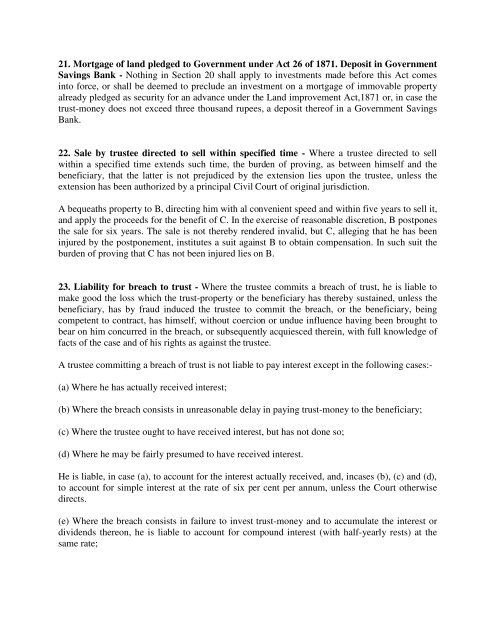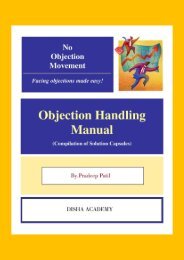INDIAN TRUST ACT 1882 BY.PRADEEP PATIL
UNDERSTANDING TRUST IN NOW A DAYS IMPORTANT FOR MARKETING FORCE OF LIFE INSURANCE
UNDERSTANDING TRUST IN NOW A DAYS IMPORTANT FOR MARKETING FORCE OF LIFE INSURANCE
You also want an ePaper? Increase the reach of your titles
YUMPU automatically turns print PDFs into web optimized ePapers that Google loves.
21. Mortgage of land pledged to Government under Act 26 of 1871. Deposit in Government<br />
Savings Bank - Nothing in Section 20 shall apply to investments made before this Act comes<br />
into force, or shall be deemed to preclude an investment on a mortgage of immovable property<br />
already pledged as security for an advance under the Land improvement Act,1871 or, in case the<br />
trust-money does not exceed three thousand rupees, a deposit thereof in a Government Savings<br />
Bank.<br />
22. Sale by trustee directed to sell within specified time - Where a trustee directed to sell<br />
within a specified time extends such time, the burden of proving, as between himself and the<br />
beneficiary, that the latter is not prejudiced by the extension lies upon the trustee, unless the<br />
extension has been authorized by a principal Civil Court of original jurisdiction.<br />
A bequeaths property to B, directing him with al convenient speed and within five years to sell it,<br />
and apply the proceeds for the benefit of C. In the exercise of reasonable discretion, B postpones<br />
the sale for six years. The sale is not thereby rendered invalid, but C, alleging that he has been<br />
injured by the postponement, institutes a suit against B to obtain compensation. In such suit the<br />
burden of proving that C has not been injured lies on B.<br />
23. Liability for breach to trust - Where the trustee commits a breach of trust, he is liable to<br />
make good the loss which the trust-property or the beneficiary has thereby sustained, unless the<br />
beneficiary, has by fraud induced the trustee to commit the breach, or the beneficiary, being<br />
competent to contract, has himself, without coercion or undue influence having been brought to<br />
bear on him concurred in the breach, or subsequently acquiesced therein, with full knowledge of<br />
facts of the case and of his rights as against the trustee.<br />
A trustee committing a breach of trust is not liable to pay interest except in the following cases:-<br />
(a) Where he has actually received interest;<br />
(b) Where the breach consists in unreasonable delay in paying trust-money to the beneficiary;<br />
(c) Where the trustee ought to have received interest, but has not done so;<br />
(d) Where he may be fairly presumed to have received interest.<br />
He is liable, in case (a), to account for the interest actually received, and, incases (b), (c) and (d),<br />
to account for simple interest at the rate of six per cent per annum, unless the Court otherwise<br />
directs.<br />
(e) Where the breach consists in failure to invest trust-money and to accumulate the interest or<br />
dividends thereon, he is liable to account for compound interest (with half-yearly rests) at the<br />
same rate;


















